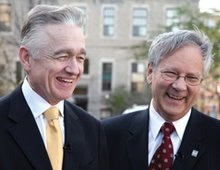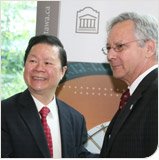
An all-day labour law arbitration hearing was held and concluded with decision on Wednesday May 5, 2010, in Ottawa. Ministry labour arbitrator Mary-Ellen Cummings presided.
The University of Ottawa side was represented by human resources boss Jean-Yves Leduc, his chief administrative assistant Beatrice Magyar, and hired corporate lawyer Andre Champagne.
The teacher assistant union (CUPE Local 2626), in what was its very first arbitration, was represented by undergraduate law student Dennis Stark. Members of the union executive and other union officers were present as advisers. The griever was union member and scholarship physics graduate student Joseph Hickey.
The main matter at hand was a letter of discipline which the University had placed in Hickey's employee file. The union grieved that the letter contained inappropriate and damaging allegations and that the letter had no business being in the employee's file. Among other things, the letter contained an assertion of Hickey's guilt regarding a graffiti charge and a paternalistic threat of additional and prolonged trespass from the university; where the first trespass charge is scheduled for trial on June 2, 2010 (at which president Allan Rock has been subpoenaed to appear).
The union won the day when the university, following multiple refusals to do so again repeated at arbitration, volunteered - with the arbitrator as witness - to immediately remove the letter from Hickey's file rather than be subjected to the arbitrator's formal ruling on the matter.
But the story is all in the ride. The university played hard ball to the limit of ethical behaviour until it became clear at arbitration during the union's counter arguments and the arbitrator's questions of clarification that the university would lose, despite Champagne's elaborate two-hour legal construction. The arbitrator offered a public face saving "mediation" attempt during which Champagne first said the letter in question would not be removed and later affirmed that it would be removed "no matter what." It was then finally established that the university was committing to immediate removal of the letter from Hickey's file.
Let us now review salient features of this battle in an attempt to further understand the institutional psychology of the U of O's Rock administration. And to understand how a high profile corporate team could lose in this way to disorganized amateurs in their first arbitration.
GAPING FLAWS IN CHAMPAGNE'S LEGAL ARGUMENT
 It appears that the main liability of the university was its position, boldly put forth by Champagne as something attempting to mimic logic.
It appears that the main liability of the university was its position, boldly put forth by Champagne as something attempting to mimic logic.The university first affirmed that grievance deadlines had not been respected by the union, that Hickey was not a bona fide union member in the matter in question, and that therefore the grievance could not be received and then the university filed for accelerated arbitration. Not exactly a textbook example of logical rigour.
Then Champagne's first move at arbitration was to start with a motion that the Arbitrator had no jurisdiction in this matter because it was not an employment matter. This adventure lasted two hours and was truly entertaining.
Champagne explained citing many documents that the letter had nothing to do with Mr. Hickey's employment duties and responsibilities, that the letter related to spurious charges and events disconnected in time and essence from the union member's work, yet Champagne reaffirmed that the letter had its place in the member's employee file. Yup, we kid you not.
Now how does a clever lawyer make such an obvious contradiction appear to be logical? Well, for a start, the employee file is called a "personal file" in the Collective Agreement (i.e., in the contract) so one never says "employee file" but rather one uses the correct term "personal file".
Now arbitrator Cummings got a whiff of this and directly asked Champagne to clarify what this "personal file" was and was it different from a student file or the employee file and was the letter in question in the employee file...? A clear, relevant and central question, as any lawyer would or should recognize. Champagne replied that there was nothing that had work-related relevance in the union member's "discipline file". "Discipline file" is not a defined term in the Collective Agreement and had not been previously used in the arbitration hearing to this point, nor was it used again by either side.
For some reason that this observer does not understand, arbitrator Cummings then dropped her question and moved it along rather than insisting on an actual answer from Champagne. In our view, Champagne's answer could reasonably be interpreted as an attempt to mislead the arbitrator, one that the arbitrator was not willing to fully expose or challenge. In our view, this was the ethical low point and turning point of the arbitration.
Champagne went on, using precedent cases, to compare the spurious graffiti allegations against Hickey to a police officer who looses his driver's license with cause and expects his employer to provide a license, to a Coka Cola truck driver who's car insurance goes up because of accidents at work who expects his employer to pay the extra insurance costs, and to a hospital worker who is charged with sexually assaulting patients who expects to be allowed to do his work without constraints, etc. We leave it to the reader to apply some amateur legal discrimination and to consider the relevance of Mr. Champagne's foray. Here Champagne uses labour arbitration rulings as examples to argue that the arbitrator does not have jurisdiction to arbitrate. It was like that from start to finish. Quite remarkable. (Someone should make an access to information request to find out how much this guy was paid.)
The union therefore needed only to establish that the so-called "personal file" is the employee file and that the letter constitutes significant and damaging discipline. As it became clear, thanks in part to pointed questions of clarification from the arbitrator, that these central points were straightforward to establish in law, the other side simply folded.
It's almost like the university had counted on lack of experience on the union side rather than attempt a valid legal approach.
 The arbitration hearing allows one to contrast a Mediacorp Canada Inc. fiction that the U of O is "among National Capital Region's top 25 employers for 2010" with reality, as follows.
The arbitration hearing allows one to contrast a Mediacorp Canada Inc. fiction that the U of O is "among National Capital Region's top 25 employers for 2010" with reality, as follows.Whereas the griever Mr. Hickey is anglophone, whereas the union lead counsel Mr. Stark is aboriginal and does not speak French, whereas no professional legal translation was available, and whereas all the university representatives are fluently bilingual (French and English), Mr. Champagne (whose corporate promotional biography starts "Fluently bilingual, André manages a substantial litigation and arbitration practice with proceedings in both French and English"), insisted on making all of his legal presentations in French only.
That's the true spirit of bilingualism that the University of Ottawa ("Canada's university") actually promotes. Bravo.
ALLERGIC REACTION TO MEDIA COVERAGE
Finally, another aspect of the arbitration hearing is also worthy of mention.
Before the start of the arbitration hearing, UofOWatch, as the sole representative of the media, asked arbitrator Cummings for permission to take photographs. Mr. Champagne overheard this request and immediately interjected with a vehement "No!" The arbitrator therefore opened this question for representations.
Mr. Champagne stated that this was a highly unusual and anomalous request that should be rejected. As argument Mr. Champagne stated that UofOWatch producer Denis Rancourt had been to arbitration at which the university sought to discipline him and that during the whole time of those hearings Rancourt had not taken any pictures. (That now familiar creative legal logic coming into play again, huh?)
Rancourt responded that it was inappropriate for Champagne to make such personal comment, that Rancourt had won the arbitration (G5), that several media pictures had been taken and had appeared in print, and that it was in the interest of transparency and the public good in a democratic society to allow media reporting of labour arbitrations.
The union stated it would defer to the arbitrator's decision.
The arbitrator formally ruled that pictures could be taken of her and of the room and of all those who wished to stay for the pictures and that those who did not want to be in the pictures could leave the room for the time of the pictures. The three university representatives immediately ran out of the room.
Here (below) are the pictures that resulted. One shows the union side with arbitrator Cummings at the head while the other picture shows the three empty chairs vacated in emergency on the university side.
Recall that the Rock administration has a history of having students arrested and criminally charged for proposing to video record the university Senate, for example.






No comments:
Post a Comment